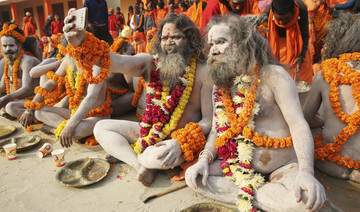JEDDAH: Muslims worldwide are welcoming the holy month of Ramadan with much anticipation and delight.
Traditionally marked by the sighting of the crescent moon, more than 1 billion Muslims will celebrate and reflect on their faith as they fast from sunrise to sunset for the whole month.
Designed to purify the body and focus on spirituality, Ramadan is a time when traditions and customs are highlighted, giving each country its unique spirit.
Every year, Muslims prepare themselves and their homes to focus on the sanctities of the month, as it commemorates the revelation of the Qur’an to the Prophet Mohammed — significant peace comes with that. Homes are calmer, prayers are heard across cities, iftar meals to break the fast are prepared early, youths volunteer and spread joy to the less fortunate, and family gatherings abound — these are just some of the highlights of the month.
There is unity and closeness; humble, shared meals; the strengthening of bonds; and spiritual reflection.
Muslims and Christians perform acts of charity by providing large banquets in front of mosques.

A Palestinian holds balloons near Jerusalem’s Dome of the Rock on June 25, 2017. (AFP)
With plenty of food to go around, it does not matter if you are poor or rich — the shared experience of generosity brings people together.
Across Saudi Arabia, Ramadan rituals are sacred in many households. As the sun starts to set, homes are filled with the smell of cardamom and Arabic coffee, which is prepared for iftar.
There is also a heady mix of fried dough, prepping for samboosa, and the sweet smell of karkadeh, a hibiscus tea. Across the Kingdom, recitals of the Qur’an can be heard as family members start trickling into their elders’ homes with dishes of Arabic sweets such as lugaymat and atayef (thin pancakes stuffed with cream or crushed fried almonds with syrup).
Saudis break their fast with a few dates and milk or a yogurt drink sometimes mixed with mint leaves.
Some families arrange a drinks tray of qamar al-din (apricot juice), soobya (a traditional Hijaz drink made from barley or bread doused in water for a few days and sweetened with sugar and raisins) and tamarind juice. Meals are light, and families relax after iftar with traditional sweets and Arabic coffee before Taraweeh prayers.
A very common custom among families of the Hijaz region is to burn mastic (a natural resin or gum extracted from mastic trees) and place jugs above the incense to mix the taste of Zamzam water (filled afterward) with the incense.
Small tin cups called tutuwah are also used to drink Zamzam water, infused with the smell of mastic incense.

Egyptian dancers perform the Tanoura during Ramadan on May 22, 2018. (AFP)
In Egypt, children run around their neighborhoods swinging a small fanoos (lantern) and singing “wahawi ya wahawi,” a folkloric song that celebrates the start of Ramadan. Egyptians decorate their homes, streets and alleyways with fawanees (plural of fanoos).
Known for their hearty cuisine, their meals are heavy for iftar and light for sahoor, the last meal of the night before resuming the fast.
Families and friends gather in mosques and pray alongside each other. After concluding prayers, they gather in homes or at cafes under lights and hanging lanterns enjoying shisha and tea. A deeply rooted Ramadan custom in Egypt and across the Levant is the mesaharati, a man who wanders neighborhoods with a small drum waking people up an hour or two before dawn for sahoor, chanting “wake up sleepy, proclaim the oneness of the Everlasting.”
The mesaharati, usually a neighborhood elder, calls each neighbor by name before heading to the next neighborhood.
Despite the war in Syria, many night markets are filled with families shopping or enjoying tea while traditional songs and folklore dances are performed for the public. Another ongoing tradition is the hakawati, or storyteller. Derived from the word for story, hekaya, the hakawati tells tales of myths, heroes and fables, as well as stories from the Qur’an.
While 40 percent of Lebanese are Christian, Ramadan is celebrated by all in Lebanon, with an abundance of stuffed grape leaves, hummus, fattoush and tabbouleh. Charities, civic organizations and businesses host fundraising iftars, and mosques and churches hold clothing drives and distribute Ramadan baskets.
In Iraq, cities have come alive again after years of nightly curfews, and public spaces are filled with people of all ages enjoying post-iftar sweets and tea, shopping and an evening stroll. Locals celebrate together as cities are filled with colors and string lights.
Mheibes, a traditional Iraqi game, is played in national championships. It is played with two teams of at least 20, with a ring hidden in the palm of a hand, and a member of the opposing team intimidating the players to see who has it.
Among the main dishes in Iraqi households are a lentil soup dish and a stew served with rice or thareed (broken pieces of flatbread steeped in the stew) with chunks of lamb. After iftar, Iraqis enjoy sweet tea and desserts such as mahalabiya, zalabia and halawat sha’iriya (golden vermicelli noodles).
So while the spiritual intention is the same, different communities display their own unique spirit of Ramadan, preserving customs for younger generations to observe and keep.




























